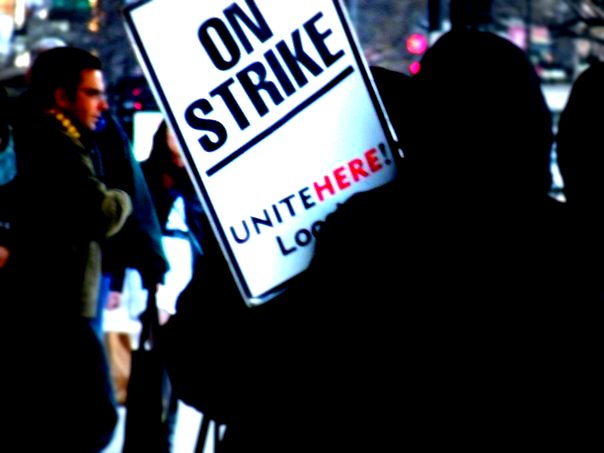Is there any reason to think strikes and the unions which call them will ever reacquire the aura of romance and moral legitimacy they once had? They come and go without glamour. Ontario just experienced another batch of teachers’ strikes which were unpopular and duly legislated back. But it could be otherwise.
I’m thinking of the students I teach at U of T each spring. During this year’s strike by teaching assistants, near the end of term, I told them to hand in their final essays whether Jeff, our TA, was back to mark them or not. One asked with moral concern if that wasn’t like telling them to cross a picket line. Look where you are, I said with exasperation. You’re in class, you already crossed the picket line. But there is no picket line, even if there’s a line somewhere on campus. You’ve been doing it for weeks. And to confuse it more, the TA’s union told you to cross and asked me and others to keep teaching.
Somewhere the script for these things got lost. The students sense it exists and are trying to recover their lines, at least some are. With the ethical sensitivity of youth, they can feel there’s a moral charge to such events, even if unions seem like they originated on another planet. Whence this instinct?
Media maven Jesse Hirsh, who visits my class annually, talks about a recent gulf between “institutional authority,” which derives from speaking for a newspaper, university, corporation etc.; versus “cognitive authority,” which emerges in direct interaction between people, and which the young find on the Internet. U of T student Olivia Dziwak has pointed out how this is specially relevant to today’s youth. They’re unimpressed with, say, political parties, but feel affinities with more immediate realities — like strikes! Why? They offer a way to engage that sense of social connectedness, beyond signing online petitions.
Except that most strikes today don’t. The union bureaucrats — oh, sorry, leaders — proclaim them and members listlessly walk out. In the many teachers’ strikes, there’s minimal interaction between actual strikers and parents or kids. Nothing gets ignited beyond the specific conflict. Speaking as a strike buff, it’s disappointing. Then the government stirs and orders them back. Finis.
Or take the sad case of the Crown Cans strike in North York: 120 workers on strike for 20 months, in a noble cause: the rights of future workers there. But what has actually happened? The union demands an inquiry. The province agrees. It drags along. The workers collect strike pay. This week a parade of union higher-ups requests binding arbitration. The province considers it. It’s all institutional. There’s scant sign of cognitive activity, much less authority.
Besides, even if strike-like action appeals to the young more than formal politics — former CBC journalist Linden MacIntyre also visited my class this year and was shocked at how uninterested most students seemed in elections — it’s unlikely they’ll ever join unions. Their work will be too “precarious”; they may never go into a workplace where they meet “brothers and sisters.” If any future union model makes sense, it may be more like the radical IWW a century ago, the Wobblies, where any working person could join and get active.
So why expend time on this subject? Does anyone with political concerns still take unions and strikes seriously? Yes, in fact: the political right. In the U.S. the front-runner for the Republican presidential nomination is Scott Walker, whose career was almost entirely built on union-busting and strikebreaking. Here, the Harper Tories, always alert to signals from their U.S. role models, have been swift in interrupting any large strikes, or just glimmers. Not only of present strikes but strikes past. The Star reported: “A room devoted to the 1919 Winnipeg General Strike will be excluded from the renovated Canadian Museum of History.” That was a wobbly-type strike, very grassroots and broad. Memory is a potent adversary. Even when you obliterate today’s eruptions, the past can come alive in people’s minds and threaten all your apparent victories.
So is the right just bullying a virtual corpse that can’t fight back? Possibly. Or might they sense that, though the body is in the coffin, it isn’t dead yet?
This column was first published in the Toronto Star.
Photo: Noora A-T/flickr



